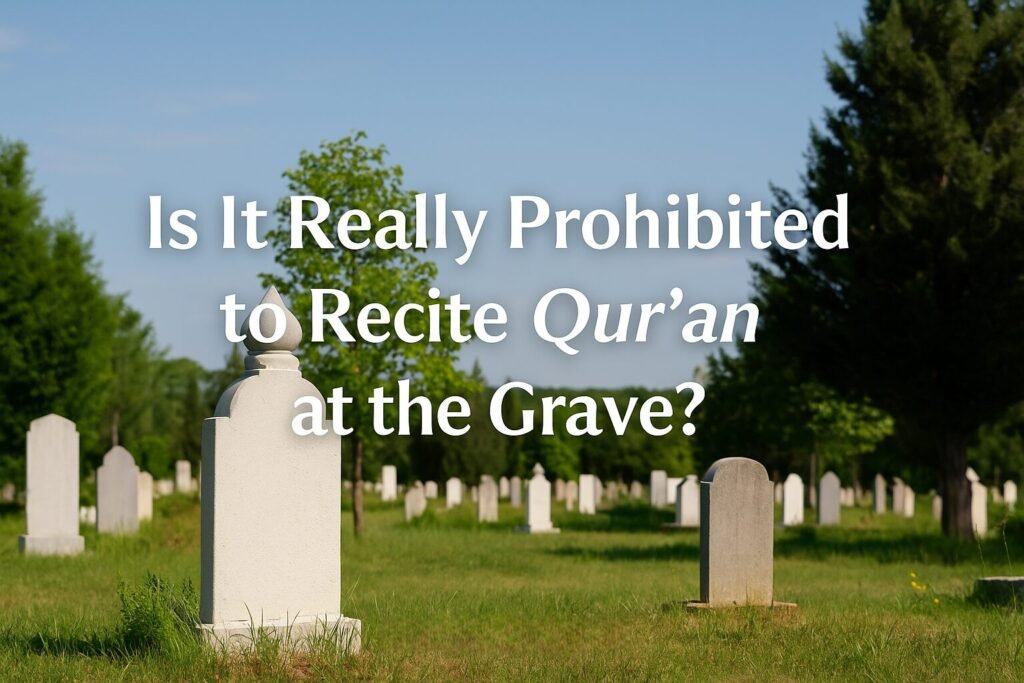Recently, a Salafi brother sincerely advised me: “It is not allowed to recite the Qur’an in a cemetery.” This caught me off guard. For many of us in Southeast Asia, reciting Surah Yasin or verses of the Qur’an while visiting the graves of our loved ones is an act of love, remembrance, and hope. I decided to dive deep, exploring hadith, scholarly views, the practice of the Sahabah, and reasoning with both heart and intellect. This post is my respectful reply to that concern, supported by authentic sources and working references.
1. The Twig Hadith: A Symbol of Mercy
The Prophet ﷺ once passed by two graves and said:
“They are being punished, but they are not being punished for a major sin. One of them used to spread gossip, and the other did not protect himself from urine.” Then he took a fresh green branch, split it in two, and placed one on each grave. He said, “I hope their punishment will be reduced as long as these remain fresh.”
— Sahih Bukhari 216, Sahih Muslim 292
Scholars like Imam Nawawi interpreted this to mean that dhikr done by living things (even a twig) may reduce punishment. If that’s true for a branch, what about a human consciously reciting the Qur’an?
“There is not a thing but celebrates His praise, but you do not understand their glorification.” — Surah Al-Isra (17:44)
2. Can the Living Benefit the Dead Through Dhikr or Qur’an?
Absolutely. The Prophet ﷺ said:
“When a person dies, all their deeds end except three: ongoing charity, beneficial knowledge, and a righteous child who prays for them.”
— Sahih Muslim 1631
Majority scholars (Hanafis, Hanbalis, Malikis, many Shafi’is) allow reciting Qur’an and gifting the reward (isāl al-thawāb).
🔗 SeekersGuidance: Ruling on Reciting the Qur’an for the Deceased
3. Did Any Sahabah Recite Qur’an at the Grave?
a. Abdullah ibn Umar (RA)
He instructed that Surah Al-Fatiha and the closing verses of Surah Al-Baqarah be recited at his grave.
b. Al-Lajlaj (RA)
This companion requested the beginning and ending of Surah Al-Baqarah be recited at his grave, saying he heard it from the Prophet ﷺ.
4. Scholarly Positions on Qur’an Recitation at Graves
Scholar / InstitutionPosition Imam Nawawi (Shafi’i) Allowed it based on the twig hadith analogy. Imam Ahmad ibn Hanbal Permitted gifting Qur’an reward to the deceased. Ibn Qudamah (Hanbali) Strongly supported the practice as beneficial. Ibn Taymiyyah later accepted it under the condition that it’s not ritualised. Dar al-Ifta (Egypt)Permits reciting Qur’an for the deceased with mercy in mind.
5. Objection: “Didn’t the Prophet ﷺ Forbid Praying in Graveyards?”
Yes, but this refers specifically to salah (formal prayer), not Qur’an recitation or du‘a.
“The entire earth is a place of prayer except for graveyards and bathrooms.” — Sunan al-Tirmidhi 317
“Do not pray towards graves.” — Sahih Muslim 972
However, the Prophet ﷺ visited Baqi and Uhud regularly, offering du‘a for the dead:
“Peace be upon you, O dwellers of the grave. May Allah forgive us and you.” — Sahih Muslim 975
6. What About Yasin, Fatiha, Ikhlas or Salawat?
Reciting any portion of the Qur’an with intention of reward is permissible. Although the hadith on Surah Yasin is weak, scholars accepted its general application.
Sending salawat (blessings upon the Prophet ﷺ) is always encouraged and carries barakah. If said near a grave — not directed at the dead — it adds to the gathering’s spiritual value.
7. A Respectful Response to My Salafi Brother
I respect his sincerity in avoiding bid‘ah. But there’s no hadith that directly forbids Qur’an recitation in a cemetery. There are sahabah who practiced it, and scholars from all four madhhabs have endorsed it. I recite out of love not as a ritual hoping for mercy on my parents and the ummah.
8. Final Reflection
If a green twig, whispering tasbih by default, could bring relief to a soul in the grave, then surely a human, broken-hearted and God-conscious, whispering Yasin at his mother’s resting place, is even more worthy of acceptance.
This isn’t grave worship. This is remembrance. This is mercy.


